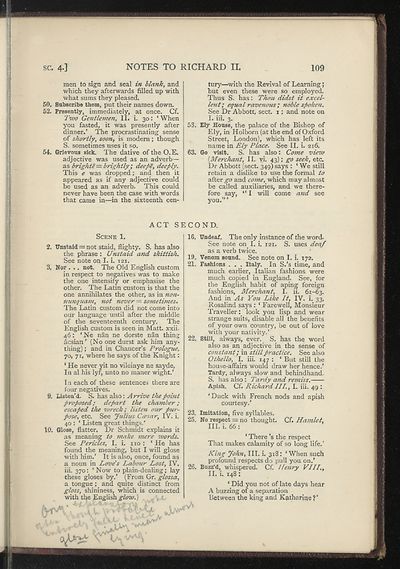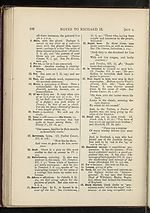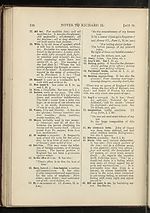Download files
Complete book:
Individual page:
Thumbnail gallery: Grid view | List view

sc. 4-]
NOTES TO RICHARD II.
109
men to sign and seal in blank, and
which they afterwards filled up with
what sums they pleased.
50. Subscribe them, put their names down.
52. Presently, immediately, at once. Cf.
Two Gentlemen, II. i. 30: ‘When
you fasted, it was presently after
dinner.' The procrastinating sense
of shortly, soon, is modern; though
S. sometimes uses it so.
54. Grievous sick. The dative oftheO.E.
adjective was used as an adverb—
as brighte =■ brightly; deepe, deeply.
This e was dropped; and then it
appeared as if any adjective could
be used as an adverb. This could
never have been the case with words
that came in—in the sixteenth cen-
53.
63.
tury—with the Revival of Learning;
but even these were so employed.
Thus S. has: Thou didst it excel¬
lent; equal ravenous ; noble spoken.
See Dr Abbott, sect. 1; and note on
I. iii. 3.
Ely House, the palace of the Bishop of
Ely, in Holborn (at the end of Oxford
Street, London), which has left its
name in Ely Place. See II. i. 216.
Go visit. S. has also: Come view
[Merchant, II. vi. 43); go seek, etc.
Dr Abbott (sect. 349) says : ‘ We still
retain a dislike to use the formal to
after go and come, which may almost
be called auxiliaries, and we there¬
fore say, “ I will come and see
you.” ’
ACT SECOND.
Scene 1.
22.
2. Unstaid=:not staid, flighty. S. has also
the phrase : Unstaid and skittish.
See note on I. i. 121.
3. Nor . .. not. The Old English custom
in respect to negatives was to make
the one intensify or emphasise the
other. The Latin custom is that the
one annihilates the other, as in non-
nunquam, not never = sometimes.
The Latin custom did not come into
our language until after the middle
of the seventeenth century. The
English custom is seen in Matt. xxii.
46: * Ne nan ne dorste nan thing
acsian* (No one durst ask him any¬
thing) ; and in Chaucer’s Prologue,
70, 71, where he says of the Knight:
‘ He never yit no vileinye ne sayde,
In al his lyf, unto no maner wight.’
In each of these sentences there are
four negatives.
9. Listen’d. S. has also: A rrive the point
proposed; depart the chamber;
escaped the wreck; listen our pur¬
pose, etc. See Julius Ccesar, IV. i.
40 : ‘ Listen great things.’
10. Glose, flatter. Dr Schmidt explains it
as meaning to make mere words.
See Pericles, I. i. no: ‘He has
found the meaning, but I will glose
with him.’ It is also, once, found as
a noun in Love's Labour Lost, IV.
iii. 370: ‘Now to plain-dealing; lay
these gloses by.’ (From Gr. glossa,
a tongue ; and quite distinct from
gloss, shininess, which is connected
with the English glow.)
(yr>*V.
v VVJrV'VT' V . I* - a-
16.
26.
Undeaf. The only instance of the word.
See note on I. i. 121. S. uses deaf
as a verb twice.
Venom sound. See note on I. i. 172.
Fashions . . . Italy. In S.’s time, and
much earlier, Italian fashions were
much copied in England. See, for
the English habit of aping foreign
fashions, Merchant, I. ii. 61-63.
And in As You Like It, IV. i. 33,
Rosalind says : ‘ Farewell, Monsieur
Traveller: look you lisp and wear
strange suits, disable all the benefits
of your own country, be out of love
with your nativity.’
Still, always, ever. S. has the word
also as an adjective in the sense of
constant; in still practice. See also
Othello, I. iii. 147 : ‘ But still the
house-affairs would draw her hence.’
Tardy, always slow and behindhand.
S. has also : Tardy a?id remiss.
Apish. Cf. Richard III., I. iii. 49 :
‘Duck with French nods and apish
courtesy.’
Imitation, five syllables.
No respect = no thought.
III. i. 66:
Cf. Hamlet,
* There’s the respect
That makes calamity of so long life.'
King John, III. i. 318: ‘ When such
profound respects do pull you on.’
Buzz'd, whispered. Cf. Henry VIII.,
II. i. 148 :
‘ Did you not of late days hear
A buzzing of a separation
Between the king and Katharine?’
NOTES TO RICHARD II.
109
men to sign and seal in blank, and
which they afterwards filled up with
what sums they pleased.
50. Subscribe them, put their names down.
52. Presently, immediately, at once. Cf.
Two Gentlemen, II. i. 30: ‘When
you fasted, it was presently after
dinner.' The procrastinating sense
of shortly, soon, is modern; though
S. sometimes uses it so.
54. Grievous sick. The dative oftheO.E.
adjective was used as an adverb—
as brighte =■ brightly; deepe, deeply.
This e was dropped; and then it
appeared as if any adjective could
be used as an adverb. This could
never have been the case with words
that came in—in the sixteenth cen-
53.
63.
tury—with the Revival of Learning;
but even these were so employed.
Thus S. has: Thou didst it excel¬
lent; equal ravenous ; noble spoken.
See Dr Abbott, sect. 1; and note on
I. iii. 3.
Ely House, the palace of the Bishop of
Ely, in Holborn (at the end of Oxford
Street, London), which has left its
name in Ely Place. See II. i. 216.
Go visit. S. has also: Come view
[Merchant, II. vi. 43); go seek, etc.
Dr Abbott (sect. 349) says : ‘ We still
retain a dislike to use the formal to
after go and come, which may almost
be called auxiliaries, and we there¬
fore say, “ I will come and see
you.” ’
ACT SECOND.
Scene 1.
22.
2. Unstaid=:not staid, flighty. S. has also
the phrase : Unstaid and skittish.
See note on I. i. 121.
3. Nor . .. not. The Old English custom
in respect to negatives was to make
the one intensify or emphasise the
other. The Latin custom is that the
one annihilates the other, as in non-
nunquam, not never = sometimes.
The Latin custom did not come into
our language until after the middle
of the seventeenth century. The
English custom is seen in Matt. xxii.
46: * Ne nan ne dorste nan thing
acsian* (No one durst ask him any¬
thing) ; and in Chaucer’s Prologue,
70, 71, where he says of the Knight:
‘ He never yit no vileinye ne sayde,
In al his lyf, unto no maner wight.’
In each of these sentences there are
four negatives.
9. Listen’d. S. has also: A rrive the point
proposed; depart the chamber;
escaped the wreck; listen our pur¬
pose, etc. See Julius Ccesar, IV. i.
40 : ‘ Listen great things.’
10. Glose, flatter. Dr Schmidt explains it
as meaning to make mere words.
See Pericles, I. i. no: ‘He has
found the meaning, but I will glose
with him.’ It is also, once, found as
a noun in Love's Labour Lost, IV.
iii. 370: ‘Now to plain-dealing; lay
these gloses by.’ (From Gr. glossa,
a tongue ; and quite distinct from
gloss, shininess, which is connected
with the English glow.)
(yr>*V.
v VVJrV'VT' V . I* - a-
16.
26.
Undeaf. The only instance of the word.
See note on I. i. 121. S. uses deaf
as a verb twice.
Venom sound. See note on I. i. 172.
Fashions . . . Italy. In S.’s time, and
much earlier, Italian fashions were
much copied in England. See, for
the English habit of aping foreign
fashions, Merchant, I. ii. 61-63.
And in As You Like It, IV. i. 33,
Rosalind says : ‘ Farewell, Monsieur
Traveller: look you lisp and wear
strange suits, disable all the benefits
of your own country, be out of love
with your nativity.’
Still, always, ever. S. has the word
also as an adjective in the sense of
constant; in still practice. See also
Othello, I. iii. 147 : ‘ But still the
house-affairs would draw her hence.’
Tardy, always slow and behindhand.
S. has also : Tardy a?id remiss.
Apish. Cf. Richard III., I. iii. 49 :
‘Duck with French nods and apish
courtesy.’
Imitation, five syllables.
No respect = no thought.
III. i. 66:
Cf. Hamlet,
* There’s the respect
That makes calamity of so long life.'
King John, III. i. 318: ‘ When such
profound respects do pull you on.’
Buzz'd, whispered. Cf. Henry VIII.,
II. i. 148 :
‘ Did you not of late days hear
A buzzing of a separation
Between the king and Katharine?’
Set display mode to:
![]() Universal Viewer |
Universal Viewer | ![]() Mirador |
Large image | Transcription
Mirador |
Large image | Transcription
| Antiquarian books of Scotland > Languages & literature > Shakespeare's Richard II > (111) |
|---|
| Permanent URL | https://digital.nls.uk/109386202 |
|---|
| Description | Thousands of printed books from the Antiquarian Books of Scotland collection which dates from 1641 to the 1980s. The collection consists of 14,800 books which were published in Scotland or have a Scottish connection, e.g. through the author, printer or owner. Subjects covered include sport, education, diseases, adventure, occupations, Jacobites, politics and religion. Among the 29 languages represented are English, Gaelic, Italian, French, Russian and Swedish. |
|---|

